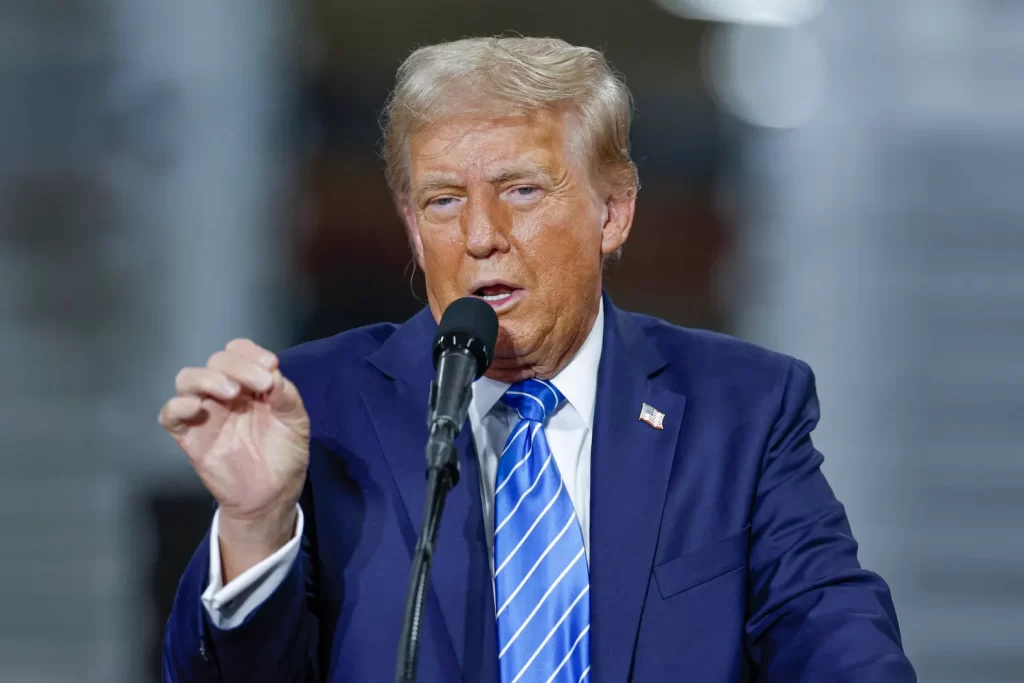Trump calls on GOP senators vying to be majority leader to agree to recess appointments
4 min read
Donald Trump in Waunakee, Wisconsin, October 1, 2024. Kamil Krzaczynski/AFP/Getty Images

Donald Trump in Waunakee, Wisconsin, October 1, 2024. Kamil Krzaczynski/AFP/Getty Images
President-elect Donald Trump is calling on Republican senators vying for the position of Senate Majority Leader to support his push for recess appointments, a method that would allow him to bypass Congress and appoint nominees without Senate confirmation. This tactic, which has recently been blocked by the minority party, could become a major point of contention in the ongoing battle for GOP leadership in the Senate.
In a post on X (formerly Twitter) on Sunday, Trump stressed that any Republican senator seeking the leadership role must agree to use recess appointments to fill key positions quickly. “Any Republican Senator seeking the coveted LEADERSHIP position in the United States Senate must agree to Recess Appointments (in the Senate!), without which we will not be able to get people confirmed in a timely manner,” Trump wrote. He added, “Sometimes the votes can take two years, or more… We need positions filled IMMEDIATELY!”
The president-elect’s demand brings back a longstanding conflict between the executive and legislative branches over presidential power. Recess appointments, which allow the president to make appointments when the Senate is not in session, have been a point of contention for decades, with the Supreme Court previously siding with the Senate’s authority in the matter. While recess appointments allow the president to bypass Senate confirmation, they are vulnerable to filibuster attempts by the opposition party, which could block such motions.
During Trump’s first term, for example, Democrats blocked his attempt to use recess appointments to replace Attorney General Jeff Sessions. This history has made recess appointments a controversial tool, especially with the Senate’s ability to block the resolutions needed to trigger a recess.
Despite the risks, many of the senators running for leadership have signaled their support for Trump’s proposal. Florida Senator Rick Scott, who has emerged as a long-shot contender for the leadership position, quickly voiced his endorsement of Trump’s post. “100% agree. I will do whatever it takes to get your nominations through as quickly as possible,” Scott wrote on X. Trump ally Elon Musk also expressed support for Scott, tweeting, “Rick Scott for Senate Majority Leader!”
Scott has garnered backing from several conservative senators and figures, including former Fox News host Tucker Carlson, entrepreneur Vivek Ramaswamy, and Robert F. Kennedy Jr. Senators Rand Paul, Bill Hagerty, and Marco Rubio have also expressed support for Scott’s bid. However, Scott remains an underdog in the race, with Senate Whip John Thune of South Dakota and Senator John Cornyn of Texas seen as the front-runners. Both Thune and Cornyn have also indicated their openness to Trump’s proposal.
Thune, in particular, posted on X that “all options are on the table” to expedite the confirmation of Trump’s nominees. “We must act quickly and decisively to get the president’s nominees in place as soon as possible, & all options are on the table to make that happen, including recess appointments,” Thune wrote. “We cannot let Schumer and Senate Dems block the will of the American people.”
Cornyn, meanwhile, called it “unacceptable” for Senate Democrats to block Trump’s appointments. He vowed that if Democrats attempted to do so, Republicans would remain in session, even working through weekends, until they relented. “The Constitution expressly confers the power on the President to make recess appointments,” Cornyn wrote, emphasizing that this power should be exercised to ensure swift appointments.
Trump’s comments also included a call for Senate Republicans to block any efforts by the current Democratic-controlled Senate to confirm judges before the GOP takes control. “No Judges should be approved during this period of time because the Democrats are looking to ram through their Judges as the Republicans fight over Leadership,” Trump posted, urging Republicans to stand firm against further judicial appointments by Democrats. However, with Democrats controlling the Senate for the remainder of President Biden’s term, they do not require GOP votes to confirm judges.
The debate over recess appointments is now complicating the GOP leadership election. The tactic was once used as a last-ditch effort for presidents to get their nominees confirmed when faced with long delays in the Senate. For instance, President George W. Bush used a recess appointment to install John Bolton as U.S. Ambassador to the United Nations, bypassing Senate opposition.
However, Senate Majority Leader Harry Reid, a Democrat, responded by holding pro forma sessions—brief meetings where the Senate is technically in session but does not conduct business—thereby preventing recess appointments. This tactic continued under Senate Majority Leader Mitch McConnell during President Obama’s term, ultimately leading to a Supreme Court ruling in favor of the Senate’s authority to block such appointments.
Today, pro forma sessions are still held to ensure that recess appointments cannot be made during these brief breaks in Senate business. The issue of recess appointments is once again at the center of a power struggle between the executive branch and the Senate, with Trump’s demands for their use adding complexity to the already heated leadership contest.
As the Senate prepares to return to Washington this week, the clash over recess appointments is likely to be a significant point of discussion in the leadership race, potentially shaping the future of GOP strategy in the next Congress.